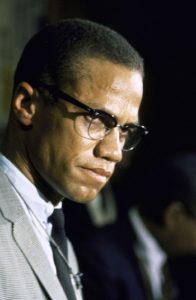
Malcolm X
This date marks the birthday of Malcolm X in 1925. He was a Black activist and religious leader.
Malcolm Little (his name at birth) and El-Hajj Malik-Shabazz (his Muslim name) were from Omaha, Nebraska. Growing up in Lansing, Michigan, Malcolm saw his house burned down at the hands of the white supremacist Ku Klux Klan. Two years later, his father, Earl, was murdered, and Malcolm's mother, Louise Little, was placed in a mental institution. Malcolm spent the following years in detention homes, and in his early teens, he moved to Boston to live with his sister. In 1946, while in prison for burglary, he was converted to the Nation of Islam; this sect professed the superiority of Black people and the inherent evil of Whites.
Released from prison in 1952, Malcolm went to the Nation of Islam headquarters in Chicago, met the sect's leader, Elijah Muhammad, and embraced its rigorous asceticism. He changed his last name to "X," a custom among Nation of Islam followers who considered their family names to have originated with white slaveholders. Malcolm X was sent on speaking tours around the country and soon became the most effective speaker and organizer for the Nation of Islam. He founded many new mosques and significantly increased the movement's membership. In 1961, he founded Muhammad Speaks, the movement's official publication.
He was eventually assigned as minister of the important Mosque Number Seven in New York City's Harlem area. Speaking with bitter eloquence against the white exploitation of Black people, Malcolm developed a brilliant platform style, which soon won him a large and dedicated following. He derided the American Civil Rights movement and rejected integration and racial equality, calling for Black separatism, Black pride, and Black self-dependence instead. He advocated violence (for self-protection) and appeared to many to be a fanatic.
Many civil rights leaders at the time rejected this style of leadership. Malcolm X described the assassination of President John F. Kennedy as a "case of chickens coming home to roost," an example of the kind of violence that Whites had long used against Blacks. Malcolm's success had, by this time, aroused jealousy within the Black Muslim hierarchy, and, in response to his comments on the Kennedy assassination, Elijah Muhammad suspended Malcolm from the movement. In March 1964, Malcolm X left the Nation of Islam and announced the formation of his religious organization.
As a result of a pilgrimage he took to Mecca in April 1964, he modified his views of Black separatism, declaring that he no longer believed Whites to be innately evil and acknowledging his vision of the possibility of world brotherhood. In October 1964, he reaffirmed his conversion to orthodox Islam. The growing hostility between Malcolm's followers and the rival Black Muslims manifested in violence and threats against his life. He articulated concepts of race pride and Black Nationalism. Malcolm X was killed at a rally of his followers at a Harlem ballroom on February 21, 1965. Three Black Muslims were convicted of the murder; one was released from prison in 2010.
After his assassination, the widespread distribution of his life story, "The Autobiography of Malcolm X" (1965), made him an ideological hero, especially among Black youth.
Black Heroes of The Twentieth Century
Edited by Jessie Carney Smith
Copyright 1998 Visible Ink Press, Detroit, MI
ISBN 1-57859-021-3
The Last Year of Malcolm X
The Revolution of a Revolutionary
by George Breitman
Merit Publishers
Library of Congress # 67-20467
Copyright 1967